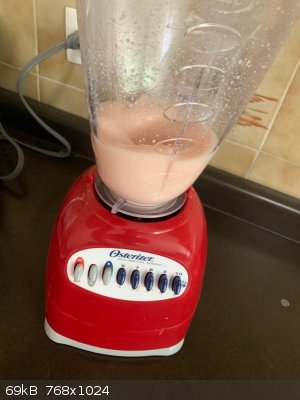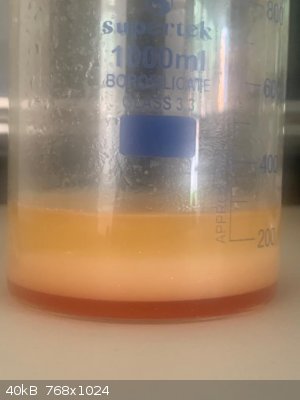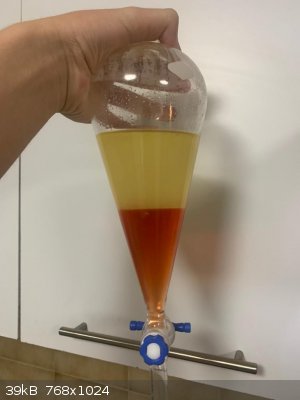MexiChemia
Harmless

Posts: 2
Registered: 19-7-2020
Location: UNAM, Mexico City
Member Is Offline
|
|
Comparing Biodiesel Production Efficiency When Using Different Vegetable Oils
Abstract: The yield of the transesterification reaction to make biodiesel was measured when the reaction was performed with canola,
corn, and soybean cooking oils. The procedure consisted of making a solution of sodium hydroxide in 75% methanol/water and mixing it with the
aforementioned vegetable oils using a blender. The results are approximated since it was not possible to separate biodiesel from oil; however, the
volume of the remaining aqueous layer was used as a reference to indicate the efficiency of the reaction.
Attachment: biodiesel_gallardoloya_garciaponce.pdf (237kB)
This file has been downloaded 683 times
|
|
|
Fery
International Hazard
    
Posts: 1015
Registered: 27-8-2019
Location: Czechoslovakia
Member Is Offline
|
|
Hi MexiChemia, very nice and welcome to the forum.
I see that you used diluted methanol (75%). Solubility of NaOH in anhydrous methanol should be 238 g/L according wikipedia (without mentioning
temperature, so who knows?) so the H2O seems not to be necessary to dissolve the hydroxide in methanol. Methanol in your reaction does
transesterification while for H2O with NaOH I expect hydrolysis and saponification thus creating a lot of fatty acids sodium salts (soap) - did you
observe some emulsification and thus slower and worse separation or was the separation smooth?
|
|
|
MexiChemia
Harmless

Posts: 2
Registered: 19-7-2020
Location: UNAM, Mexico City
Member Is Offline
|
|
Hello Fery,
The methanol used was contaminated with water, and since I don't have access to my distillation apparatus I wasn't able to purify it. I am aware that
it was of inconvenience and it made the reaction slower, but there was no getting around that.
Another thing that happened (mostly with the soybean oil runs), is that there was a gel similar in consistency to that of polyacrylate fake snow that
formed after letting the aqueous waste undisturbed for 1-2 days. I yet don't have a clue of what this might be, but it might be related to some
saponification products.
As for your question, when the mixture came out of the blender, it was an unstable emulsion, so it separated out rather quickly and smoothly (in all
the runs, all we needed to do was wait 90 minutes to watch the two phases separate). I annexed some pictures so you can see how the blend, the
intermediate phase (which only lasted about an hour), and the final separated mixture look like.
If you have any more questions or suggestions, feel free to make them.
  
|
|
|